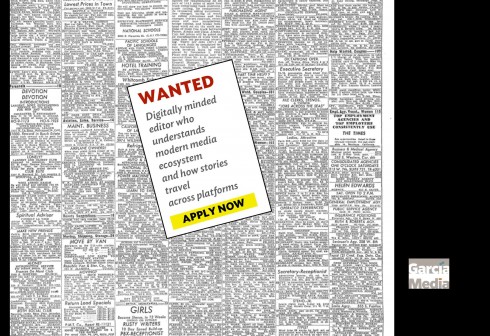TAKEAWAY: Digital storytellers are in demand, so what should their profile be like? Start with loving a good story, then add an understanding of the modern media ecosystem and how stories travel across platforms, and finish with appreciating and supporting the talents of those in her newsroom.

It is the profile everyone is looking for around the world:an editor who understands the foundations of good journalism -which we should refer to as storytelling in the rest of this blog post. In addition, an editor who has a keen understanding of how news travels today (starts with a mobile device), the new definition of news (what you know now that you did not know 10 seconds ago), and who appreciates (and uses to his advantage) the positive side of citizen journalism, where people armed with a phone become instant reporters, photographers and videographers.
If I may add some other qualities to the profile: an editor who recognizes the individual talents of people in her newsroom, capitalizes on the ones who are ready to join on a digital journey, and who spends at least 30 minutes a day chatting with those product development team guys.
Yes, I know. This is not an easy profile to fill.
My Poynter colleague, Rick Edmonds, has recently published a piece reporting that more than 1,400 digital journalists are expected in Atlanta this week for the annual Online News Association conference.
And Rick writes:
That’s fairly close to the number of daily American newspapers, at last count roughly 1,380. With digital transformation the announced top priority for newspaper companies ranging in size from Gannett to community publishers, you would think by now many would have given the editorial reins to a digital specialist. But top editors with a strong digital background remain rare. With some rudimentary (and I am sure incomplete) checking, I could only turn up a half dozen or so.
Rick is right, and maybe even generous with his estimate of the number of truly digitally minded editors out there.
This is why I believe that the next five years are going to be transitional years in most newsrooms globally, a time in which traditional editors either embrace digital, or else. It will be a good opportunity for newsroom managers to discover native digital talent among staffers already in the newsroom.
It will all begin with changing job descriptions, updating the profiles for storytellers and realizing that digital first begins long before a story is even conceived.
It starts when the people who populate the newsroom realize the realities of today’s media landscape and join it with a positive attitude and with a willingness to learn all they can about storytelling for the era of the tablet, the phone and the everywhereness of it all.
Exciting and challenging, for sure. Digitally minded editors everywhere, seize the moment.
And here is a digital journalist in the makings
This is a great piece from a storyteller still in training for whom I anticipate a bright future.
Melanie Stone, a student at DePaul University in Chicago, writes about her dreams of studying journalism and becoming “the page-two columnist for The Chicago Tribune”. In fact, the most exciting sentence in this inspiring piece is one where she writes that this is “the golden age for journalism students.”
I add that it is also a golden age for storytellers.
This is how Melanie answers all those pessimists who discourage young talents like her to stay away from journalism.
Entry-level journalism jobs are on the rise. CNN Money has the good news: In 2009, 56% of journalism graduates were finding full-time jobs, according to a study from the University of Georgia. In 2011, it was 62%. And most recently, that number was 66%. We can thank the digital age for that uptick.
And Melanie is likely to be this new breed of storytellers whose profile I describe above. She herself sees it that way:
As the role of a beat reporter continues to become a novelty, a different form of journalism is rising from its ashes, bringing jobs to young people: social media reporters, digital editors, bloggers, and community managers.
Read more:
http://www.businessinsider.com/why-im-majoring-in-journalism-2013-10#ixzz2iC8kCt95